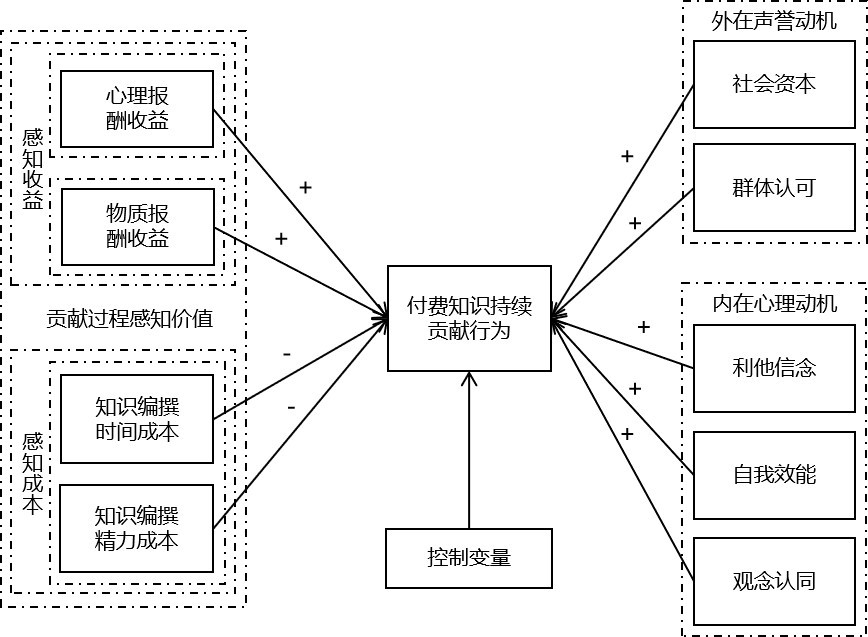 PDF(1326 KB)
PDF(1326 KB)


Research on Continuous Contribution Behavior of Paid Knowledge Based on Perceived Value and Motivation Theory——Taking Zhihu Live as an Example
Cui Zhibin, Tu Yan
Knowledge Management Forum ›› 2020, Vol. 5 ›› Issue (6) : 398-406.
 PDF(1326 KB)
PDF(1326 KB)
 PDF(1326 KB)
PDF(1326 KB)
Research on Continuous Contribution Behavior of Paid Knowledge Based on Perceived Value and Motivation Theory——Taking Zhihu Live as an Example
[Purpose/significance] With the advent of the era of paid knowledge, how to encourage high-quality content creators to contribute paid knowledge actively has become a problem for social Q&A community needs. Research on users' continuous knowledge contributing behavior is conductive to open new knowledge-paying market, and has practical significance for community long-term development. [Method/process] This paper regarded the social Q&A community Zhihu Live speaker as the research object. Based on motivation theory and perceived value theory, we explored the impact of social Q&A community users' paid knowledge contributing continuously factor through the negative binomial regression of real user data. [Result/conclusion] Live material rewards, psychological rewards, social capital, and the identity of the "pay for knowledge" concept have a significant positive impact, and the cost of knowledge compilation and users’ identity in community groups have a significant negative impact. High-threshold paid knowledge contributing behavior is not conducive to users' altruistic beliefs and self-efficacy.

paid knowledge / continuous contribution / motivation theory / perceived value theory / social Q&A community / Zhihu Live speaker
| [1] |
ZHAO L, DETLOR B, CONNELLY C E, et al. Sharing knowledge in social Q&A sites: the unintended consequences of extrinsic motivation[J]. Journal of management information systems, 2016, 33(1): 70-100.
|
| [2] |
李颖,肖珊.知识问答社区用户心流体验对持续知识共享意愿的影响研究——以PAT模型为视角[J].现代情报,2019,39(2):111-120.
|
| [3] |
卢艳强,李钢.网络环境下的用户持续知识分享行为分析——TRA、TPB与持续使用理论的比较[J].图书馆理论与实践,2019(3):50-55,81.
|
| [4] |
龚主杰,赵文军,熊曙初.基于感知价值的虚拟社区成员持续知识共享意愿研究[J].图书与情报,2013(5):89-94.
|
| [5] |
商宪丽,王学东.学术博客用户持续知识共享行为分析:氛围感、交互感和价值感的影响[J].情报科学,2016,34(7):125-130,135.
|
| [6] |
陈明红.学术虚拟社区用户持续知识共享的意愿研究[J].情报资料工作,2015(1):41-47.
|
| [7] |
赵保国,姚瑶.用户持续使用知识付费APP意愿的影响因素研究[J].图书馆学研究,2017(17):96-101.
|
| [8] |
王婷婷,戚桂杰,张雅琳,等.开放式创新社区用户持续性知识共享行为研究[J].情报科学,2018,36(2):139-145.
|
| [9] |
李武,艾鹏亚,宾锋.粉丝力量与知识付费:在线问答平台用户付费围观行为研究[J].图书馆杂志,2019,38(4):74-81.
|
| [10] |
ZHAO Y, ZHAO Y, YUAN X, et al. How knowledge contributor characteristics and reputation affect user payment decision in paid Q&A? an empirical analysis from the perspective of trust theory[J]. Electronic commerce research and applications, 2018,31: 1-11.
|
| [11] |
TOUBIA O, STEPHEN A T. Intrinsic vs image-related utility in social media: why do people contribute content to twitter?[J]. Marketing science, 2013, 32(3): 368-392.
|
| [12] |
CLOSE A G, KUKAR-KINNEY M. Beyond buying: motivations behind consumers' online shopping cart use[J]. Journal of business research, 2010, 63(9/10): 986-992.
|
| [13] |
ZHAO Y, PENG X, LIU Z, et al. Factors that affect asker's pay intention in trilateral payment‐based social Q&A platforms: from a benefit and cost perspective[J]. Journal of the association for information science and technology, 2019,71(5):516-528.
|
| [14] |
KANKANHALLI A, TAN B C, WEI K, et al. Contributing knowledge to electronic knowledge repositories: an empirical investigation[J]. MIS quarterly, 2005, 29(1): 113-143.
|
| [15] |
王秀丽.网络社区意见领袖影响机制研究——以社会化问答社区“知乎”为例[J].国际新闻界,2014,36(9):47-57.
|
| [16] |
SONG S, WANG W, QUE X, et al. Modeling leading users in professional social-network based community question answering services[J]. Journal of computational information systems,2014,10(8):3197-3204.
|
| [17] |
甘春梅,黄悦.社会化问答社区不同用户行为影响因素的实证研究[J].图书情报知识,2017(6):114-124.
|
| [18] |
LIN H F. Effects of extrinsic and intrinsic motivation on employee knowledge sharing intentions [J]. Journal of information science,2007,33(2):135-149.
|
| [19] |
赵宇翔,刘周颖.知识众包社区中用户参与意愿的实证研究:基于虚拟社区归属感的视角[J].情报资料工作,2018(3):69-79.
|
| [20] |
赵宇翔,刘周颖,朱庆华.从免费到付费:认知锁定对在线问答平台中提问者转移行为的影响研究[J].情报学报,2020,39(5):534-546.
|
| [21] |
SUN Y, WEI K, FAN C, et al. Does social climate matter? on friendship groups in social commerce[J]. Electronic commerce research and applications, 2016,18: 37-47.
|
| [22] |
刘倩,孙宝文.COI社区在线交互对用户创意质量的影响——专业成功经验的调节效应[J].南开管理评论,2018,21(2):16-27,42.
|
崔智斌:设计研究方案,论文撰写;
涂艳:提出研究思路,论文最终版本修订。
/
| 〈 |
|
〉 |